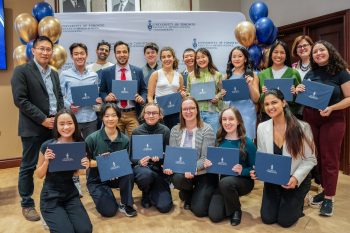With exam season underway, students receive marks reflecting what they learned — but it’s often harder to evaluate improvements to skills such as communication, relationship building or team problem solving, especially in large classes.
Now, as they complete their final group presentations for the semester, U of T Engineering students are receiving feedback on their team effectiveness too, thanks to a web-based tool designed to give personalized feedback based on peer- and self-evaluations.
A recent study by the Higher Education Quality Council of Ontario (HEQCO) reports on the effectiveness of the tool, which was built, tested and deployed in U of T Engineering.
The tool, called the Team Effectiveness Learning System (TELS), delivers detailed, individual and team feedback to students in very large classes. TELS invites students to assess their own performance, and that of their teammates, at critical junctures in the course. Class instructors review the feedback to gain a better understanding of how they can support both individual students and teams to ensure their success.
“The tool measures three key dimensions of team-member effectiveness: organizational, relational and communication competencies,” says Patricia Sheridan (MechE 0T9, MASc 1T1 and ChemE PhD Candidate), who is pursuing her doctorate in U of T Engineering’s Institute for Leadership Education in Engineering and led this project. “It’s a tool for informing, rather than dictating, team grades.”
Sheridan’s research, supervised by Professors Doug Reeve and Greg Evans (both ChemE), is part of the Faculty of Applied Science & Engineering’s Collaborative Program in Engineering Education.
She first piloted TELS in a class of 280 first-year students working in teams in 2012. The class was randomly divided into two groups: those using the TELS tool and those receiving unstructured feedback from peers and instructors. The TELS group logged into the web platform to evaluate themselves and their teammates at the mid-point of the course, and again after submitting final projects at the end of the semester. Sheridan has since expanded TELS into six engineering design courses, and refined the tool through three iterations.
Learn more about the research behind TELS
TELS measures a dozen aspects of team effectiveness, including how well students express their ideas, how they handle contentious problems that arose among team members, how well prepared they are for team activities, and their ability to encourage and motivate their teammates to do their best. The feedback students receive is presented as visual graphics, representing how their teammates viewed their contributions and areas for improvement. TELS provides instructors with individual, team and class-level diagnostics.
“Using the team effectiveness inventory within TELS helped our team gain conceptual knowledge of effective team behaviours that we had previously lacked,” says U of T Engineering student Geordie Distelmeyer (Year 4 ChemE), who used the tool in his environmental chemistry and engineering leadership classes. “The TELS provided a unique avenue for my team and I to gain feedback, and helped us grow towards our future state goal of high performance teaming.”
Investigating new methods to improve engineering education was a change in research direction for Sheridan, who completed her undergraduate degree in mechanical engineering and her master’s degree in robotics, both at U of T.
“It was a paradigm shift, but I definitely apply my engineering thinking to the classroom,” says Sheridan. “Robots are predictably logical — with students, sometimes I have no idea where they’re going and when they show me what they’ve come up with, I’m amazed.”
A number of universities and academic institutions across Canada and the U.S. have contacted Sheridan to express interest in adopting TELS, and she is now working to make the platform available to other schools.
Sheridan has seen first-hand how improving interpersonal skills can have lasting effects for students beyond the classroom. “When I have students come back to me later and tell me they’ve applied something they learned in the workplace or in a new team situation, that’s the most satisfying feeling.”



